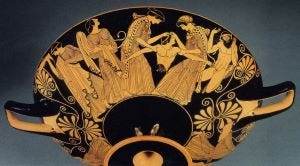

Discover more from Life in the 21st Century
The Bacchae
Downpresser man
Where you gonna run to
All along that day
You gonna run to the sea
But the sea will be boiling
All along that day
- Peter Tosh*
*The band here is Sly, Robbie, and “Mao” Chung – Tosh's original. What must have been going through that cute little communicant’s mind all those years ago?
“The world is full of cowards. You see cowards a lot when you’re doing something that’s honest, because you remind people of their own dishonesty.”
– Mother Sinead, who left the building a year ago.
I just finished a good history, Thebes: The Forgotten City of Ancient Greece. It's as much a history of Ancient Greece as it is of Thebes, but that's fine. Thebes has long been sort of the weakest sister city of Greece. Athenian propaganda I suppose, as Thebes played an essential role shaping Greece. The city was the mythical birth place of Hercules and Semele, the mortal mother of the god Dionysus. It was also the setting for a number of essential Greek tragedies, including Sophocles' Oedipus Tyrannous and Euripides' The Bacchae.
Finishing Thebes, I read The Bacchae. When I finished, my first thought was what if the quack Doctor from Vienna had used The Bacchae instead of Oedipus for his far too influential and destructive musings? Well, it certainly couldn't have been any worse, maybe even helpful for family interrelations. After all, what can be said of a play where the god, Dionysus, destroys his maternal human cousin, King Pentheus of Thebes, for blasphemy — his unbelief in the eternally changing. Dionysus instigates his maenads, including the king's aunts, into ecstatic frenzy and they rip apart the king. The literal crowning blow delivered by the king's mother, Agave, who in rapturous delirium beheads her own son.
Phew! Now that would give a whole new meaning to Freudian.
All you can think upon finishing the play is boy, those Greeks. It's a great play and for a tragedy, it has a few humorous moments. For example, when Dionysus convinces Pentheus to dress as a woman so he may lay eyes on the god's sacred festival, “No man may see their mysteries.” When Pentheus appears before Dionysus in a flowing woman's robe and head wrap, he asks Dionysus if he looks like Thebes’ goddess Ion or his own mother.
Dionysus replies, “When I look on thee, it seems I see their very selves!”
The protagonist is clueless, ignoring the warnings from wiser heads about his sacrilege thoughts:
Good words come easily when what he speaks is wise and speaks for the right. Else let them never come!
Swift are yours, bright as if with thought, but have no thought at all.
Hazardous is this quick bird-like beating of thy thought where no thought dwells.
And
Listen and understand King Pentheus!
Dream not that force is power, nor, if you have a thought, and that thought is sour and sick, oh, dream not that thought is wisdom!
Words well describing so much that goes for public discourse today.
In The Birth of Tragedy, Nietzsche claimed with this play Euripides debauched the golden age of Greek tragedy represented by Sophocles and Aeschylus. Best, he attributed this degeneration to Socrates undermining the whole of Greek culture. He writes of Euripides, “The deity that spoke through him was neither Dionysus nor Apollo, but an altogether new-born demon, called Socrates.” Nietzsche can be funny, especially when wielding a hammer against established Western icons.
He continues,
“Euripides did not succeed in establishing the drama exclusively on the Apollonian, but that rather his non-Dionysian inclinations deviated into a naturalistic and inartistic tendency, we shall now be able to approach nearer to the character æsthetic Socratism, supreme law of which reads about as follows: ‘to be beautiful everything must be intelligible,’ as the parallel to the Socratic proposition, ‘only in the knowing is one virtuous.’”
Logical determination is the opposite of the Dionysian tragedy in which the unknown, the unknowable chaos of nature remains a mystery, an eternal indeterminate force. A couple years ago, I wrote in more detail about Greek tragedy in Binding Prometheus, the eternal struggle between the Apollonian human intellect and greater nature's Dionysian indeterminism. Both are more relevant today in our Socratic technological age where our “Tech visionaries,” just as Socrates, believe they were “called upon to, correct existence; and, with an air of disregard and superiority, as the precursor of an altogether different culture, art, and morality, enter single-handed into a world, of which, if we reverently touched the hem, we should count it our greatest happiness.”
Nietzsche points out Euripides does at one point question Socratic logic’s dominance over Dionysian nature. “The judgment of the two old sages, Cadmus and Tiresias, seems to be also the judgment of the aged poet: that the reflection of the wisest individuals does not overthrow old popular traditions, nor the perpetually propagating worship of Dionysus, that in fact it behoves us to display at least a diplomatically cautious concern in the presence of such strange forces.”
Our simplistic understanding, our worship of Apollonian technology neither displaces or places us outside Dionysian nature. Whatever technological tweak “forward” today is returned thousands of different ways tomorrow. In furious opposition to our Tech neo-tyrants marketing, there is no end, only innumerable, interconnected, endlessly complex cyclical ecologies. Change one place produces countless changes elsewhere. Changes the instigator never controls, but to which they can only react. Call it tragedy. Call it life.
# # #
Dionysian summer music
Subscribe to Life in the 21st Century
History, Science, Energy, Technology, Environment, and Civilization






